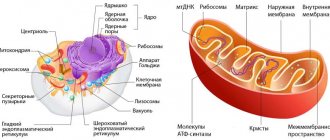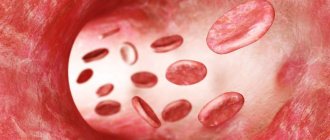Calcitonin (quantitative)
Calcitonin is a thyroid hormone synthesized in parafollicular cells, one of the main regulators of calcium-phosphorus metabolism. Calcitonin is a thyroid hormone produced in parafollicular cells (C-cells), one of the most important regulators of calcium-phosphorus metabolism. The formation of calcitonin directly depends on the level of calcium in the blood: when it rises, the concentration of calcitonin increases, and when it falls, it decreases. Once in the blood, calcitonin quickly disappears from it; its half-life, according to various sources, ranges from 2 to 15 minutes. Osteocytes (bone cells) have special receptors, acting on which calcitonin increases the flow of calcium from the blood into the bones, which inhibits bone resorption (destruction, decrease in mineral density). Thus, the action of calcitonin is aimed at reducing blood calcium levels and inhibiting bone demineralization. Calcitonin is a direct antagonist of parathyroid hormone (PTH), a hormone of the parathyroid glands. The effect of PTH is directly opposite to the effect of thyrocalcitonin, although it is also regulated by the concentration of calcium in the blood. It removes calcium from the bones to maintain its desired concentration in the blood. Calcitonin and PTH in a healthy person, interacting with each other, are in balanced quantities for the normal regulation of calcium-phosphorus metabolism, which is mainly responsible for bone density. Vitamin D3 plays an important role in regulating the PTH-calcitonin relationship. Thus, measuring calcitonin levels is primarily advisable in cases of disturbances in calcium-phosphorus metabolism caused by primary osteoporosis. It should be remembered that calcitonin levels must be assessed in conjunction with other markers of bone remodeling. With secondary osteoporosis (which resulted from hypercortisolism, hypogonadism, thyrotoxicosis, hyperparathyroidism), the level of calcitonin does not decrease. The calcitonin test is extremely important for the diagnosis of medullary thyroid cancer, including the detection of multiple endocrine neoplasia syndrome (MEN-IIa, Sipple's disease), which can manifest as medullary cancer, adrenal medulla tumor (pheochromocytoma), or parathyroid hyperplasia and hyperparathyroidism . An increase in the concentration of calcitonin in the blood serum during a test with pentagastrin is the main diagnostic criterion for the presence of medullary thyroid carcinoma; the results of the study determine the stage of the disease and the size of the tumor. After administration of pentagastrin, calcitonin levels increase in almost all patients with medullary thyroid cancer. If it was already elevated, then during a test with pentagastrin it will increase 10-20 times. When the level of calcitonin is at the lower limits of normal or is not detected at all, and after stimulation with pentagastrin it increases significantly, but does not go beyond normal limits, an early stage of medullary cancer or hyperplasia of C-cells of the thyroid gland is suspected. In some patients, intravenous calcium supplements should be used as stimulation, since tumors may not respond to pentagastrin. Calcitonin testing is prescribed after surgical treatment of medullary thyroid carcinoma to evaluate the results of the operation. In particular, it is recommended to take it in the late postoperative period to monitor whether the medullary carcinoma has metastasized and whether there is a recurrence of the tumor. Since the secretion of calcitonin can be influenced by enzymes of the gastrointestinal tract (pepsin), glucagon produced by the pancreas, diseases of these organs (pancreatitis, acute cholecystitis, cirrhosis of the liver) can indirectly affect the synthesis of calcitonin. Analysis used:
- For the diagnosis of medullary thyroid cancer.
- To detect multiple endocrine neoplasia syndrome (MEN-IIa, Sipple's disease), which may manifest as medullary carcinoma, adrenal medulla tumor (pheochromocytoma) or parathyroid hyperplasia and hyperparathyroidism.
- To find out whether there are metastases of medullary thyroid cancer.
- For indirect assessment of the size of medullary carcinoma.
- To evaluate the outcome of surgery to remove medullary thyroid cancer.
- For the diagnosis of primary osteoporosis.
- For the diagnosis of hyper- and hypoparathyroidism.
Analysis is prescribed:
- If medullary carcinoma is suspected (with nodular formations of the thyroid gland, an increase in its size, enlargement of regional lymph nodes).
- When diagnosed with pheochromocytoma, hyperparathyroidism to exclude multiple endocrine neoplasia syndrome (MEN IIa).
- Before and after surgery to remove medullary carcinoma.
- If one of the patient's relatives had medullary cancer.
- For symptoms of osteoporosis (bone pain, deformation and multiple fractures) for a comprehensive assessment of calcium metabolism disorders.
- For calcium-phosphorus metabolism disorders (hyper-, hypoparathyroidism).
Norm of calcitonin
You need to know that there is no lower norm for this hormone. Even if its level is at zero, this is the norm. The main thing is that the concentration does not exceed the upper limit.
It makes no sense to give standards for the hormone calcitonin, since different laboratories use different models of analyzers. The form that is issued with the analysis results must indicate the actual calcitonin level and its number in accordance with the analyzer model used.
For example, the analysis can be carried out using two methods - ELISA and CLIA. In the first case, a calcitonin concentration of 0.07–12.97 pg/ml will be considered normal, in the second - no more than 1.46 pmol/ml.
With age, the indicators decrease, during pregnancy they increase, but after the birth of the baby they very quickly return to normal.
Important! The material for analysis is blood from the lateral or medial vein of the arm.
Proper preparation for analysis
In order for the analysis result to be as reliable as possible, you need to carefully prepare for it.
Important rules:
- You must stop smoking 4 hours before the test.
- Stop eating 8 hours before the test.
- Avoid physical activity on the eve of the test.
- Eliminate stressful situations
- The day before the test, you must stop eating fatty, spicy and salty foods, as well as alcohol (even weak alcoholic drinks) and energy drinks.
- Two weeks before the test you need to stop taking medications. This primarily applies to calcium supplements and oral hormonal contraceptives. If stopping medications for some reason is impossible, you should definitely inform your doctor, as well as the doctor in the laboratory, so that this fact is taken into account when interpreting the results.
- Calcitonin testing is not recommended immediately after X-ray and ultrasound examinations.
- For women, the test is best given in the first phase of the cycle after the end of menstrual bleeding.
The following factors may affect the result:
- exercise stress;
- taking calcium supplements;
- circadian rhythm - the concentration of the hormone increases by noon, so you need to donate blood in the morning.
Calcitonin increased
As already mentioned, you should not worry about low or zero calcitonin levels - in any case, this will be a variant of the norm. However, further examination is still recommended, since stable low calcitonin can be observed in osteoporosis.
High hormone levels may indicate:
- pancreatic diseases;
- neoplasms in the thyroid gland, respiratory organs, mammary gland;
- thyroiditis is an inflammatory process in the thyroid gland;
- renal failure;
- cirrhosis of the liver;
- pernicious anemia.
If the secretion of calcitonin is disrupted, calcium begins to be washed into the bloodstream, which provokes degeneration of muscle and bone tissue. There may also be a deficiency of calcium, vitamin D, salt deposits in tissues and an increase in phosphorus concentration.
Of course, the most alarming diagnosis for elevated calcitonin is thyroid cancer. The malignant process in this organ develops slowly, but almost always metastasizes. However, it is impossible to draw any conclusions solely on the basis of a calcitonin test. Firstly, thyroid cancer is not a very common disease, and secondly, there are many other conditions in which calcitonin can have elevated values.
Reference! In thyroid cancer, calcitonin is significantly elevated.
Separately, it should be said about the increase in hormone levels after cancer treatment. This means that before surgical treatment the tumor had already metastasized or the disease had relapsed.
When should you take the test?
Content:
- When should you take the test?
- Preparatory stage
- Reasons for deviation from standards
Most often, this test is offered to those who have a node or several nodes in the thyroid gland. Moreover, it must be taken into account that calcitonin can indicate the presence of only one rather rare type of thyroid cancer, and it is useless for diagnosing other types of malignant tumors. Therefore, in addition to a blood test for calcitonin, in the presence of a solid nodule of 1 cm or more, the thyroid gland must also be punctured under ultrasound control in order to collect material from the nodule and see under a microscope what cells this node consists of. That is, a calcitonin test does not replace a puncture, just as a puncture does not cancel the analysis. The fact is that medullary cancer on puncture can give a picture as some kind of colloid, i.e. benign node. In addition, medullary cancer can also develop in small nodes, and it needs to be diagnosed in a timely manner, which a blood test for calcitonin can do very well.
Even after surgery, during which specialists removed the tumor, you will have to take the test again.
It allows you to compare the results with each other in order to eliminate the risk of repetition of the clinical picture. A new control analysis helps track positive dynamics during recovery after removal of the lesion. If a person refuses a second examination with blood donation to check for excess hormone in the body, this may make it difficult to timely diagnose the possible development of a latent relapse.
It is dangerous because it begins its activity asymptomatically, but then the situation worsens sharply, representing a more dangerous stage than with the initially diagnosed disease.
Nowadays, the practice is welcomed when family members of someone who has become a victim of a malignant cancer tumor are also sent to the laboratory for testing. This is necessary for early detection of possible pathology, especially in the case of medullary thyroid cancer, the disease can be hereditary as part of the multiple endocrine neoplasia syndrome type 2 (MEN2).
Endocrinologists advise assessing the content of this hormone on a regular basis. Annual testing is recommended along with a basic physical examination.
The relatively low price will contribute to this. The attending physician or the administration of a private medical center or laboratory will be able to accurately answer the question: how much does it cost to get tested? Here you will have to take into account the need to take accompanying hormonal tests, which is typical for people who are suspected of having abnormalities in the activity of the thyroid gland.
general characteristics
Peptide hormone. Produced by parafollicular C cells of the thyroid gland. Its physiological function as a parathyroid hormone antagonist is to inhibit bone osteoclast activity and reduce serum calcium levels. It may increase with benign lung diseases and during pregnancy. Gradually decreases with age. Typically, an increase in serum levels of both basal and stimulated levels of calcitonin during a provocative test with intravenous calcium administration serves as the main diagnostic criterion for medullary thyroid carcinoma, even in the absence of radioisotope diagnostic data, and correlates with the stage of the disease and the size of the tumor. An unfavorable prognostic criterion for medullary carcinoma after surgery is considered to be an increase in calcitonin levels > 150 pg/ml and a reduction in the time for a twofold increase in calcitonin levels from 2 years to 6 months.






